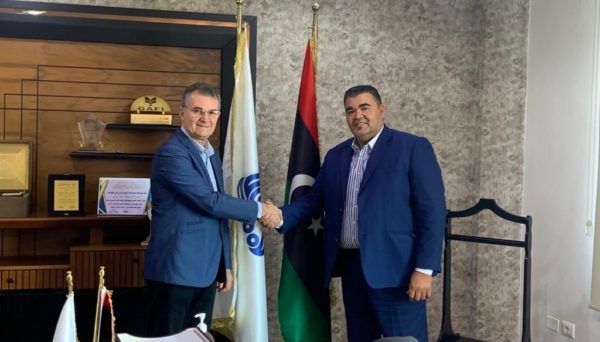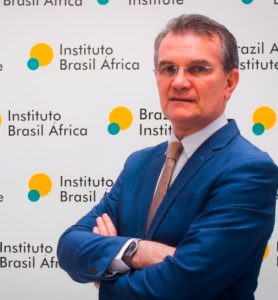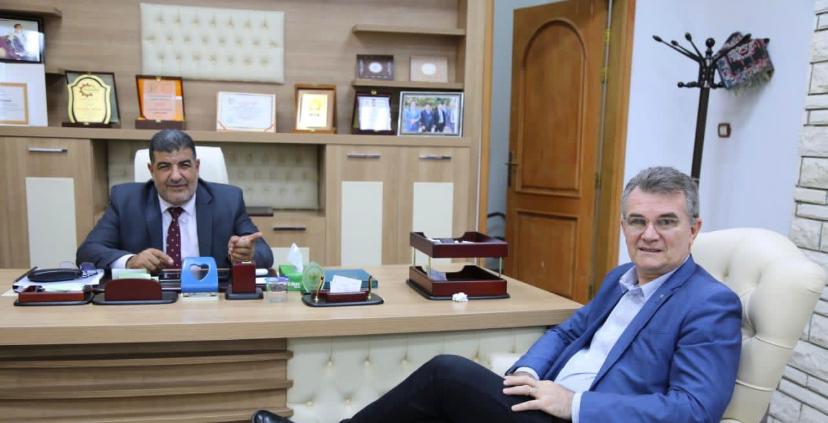São Paulo – Libyan authorities told Brazil Africa Institute (IBRAF) president João Bosco Monte they want to resume talks with Brazil and restore ties with the Latin American country. Libya went through a revolution in 2011 and is now governed by two rival political forces, one from its capital Tripoli and the other from the city of Benghazi in the East of the country.

Brazil’s Bosco Monte visited Libya last week and was welcomed by authorities and ministers based in Tripoli, including Agriculture & Livestock deputy minister Muhammad Al-Turki (opening picture) Authority for Investment Promotion president Abdulaziz Eshawish.
“Since the revolution, talks have slowed down, and in a very pragmatic manner, I intended to restore the ties Brazil had with Libya for a while,” said Bosco Monte, who went to the country to promote the Brazil Africa Forum the institution will hold in São Paulo from October 31 to November 1st.
Before the revolution, Brazil had an established relation with Libya. President Luiz Inácio Lula da Silva traveled to Libya in both his first and second term, and the Libya government sent several senior officials to Brazil in the 2000s. Brazil used to have an ambassador in Tripoli, and Brazilian construction firms operated in the country.
Exports from Brazil to Libya spiked from USD 35.1 million in 2001 to USD 456 million in 2010, shrinking to USD 141.4 million in 2016, and returning to higher levels last year, at USD 320 million. Brazil’s embassy in Tripoli was transferred to Tunis, Tunisia, in 2012, for security reasons.
Bosco Monte met with Libya economy, agriculture, investment and transport officials. “They were all willing to talk and resume talks with Brazil,” he said, adding that Libyans preserve the memory of the relation Brazil used to have with their country.

The IBRAF’s president sees several paths for the rapprochement with Libya, including a Brazilian participation in the Arab country’s infrastructure agenda and agricultural cooperation. In agriculture, he received demands for training people, seed production and improvement, and product transformation for adding value. Bosco Monte also noticed a desire from Libya authorities for their country to be a catalyst for Brazil’s trade with the region.
Bosco Monte said his meetings were intended to foster Brazil-Libya ties. He points out that not only Brazil but other countries have also drifted away from Libya and are now reconnecting. “I heard from many that the Brazilian brand is a relevant brand, and I believe this is the driver we need to use to reclaim our space, the agenda we used to have there and have lost since. If we don’t do it, others will,” he said.
He said he saw a city of Tripoli that’s very different from what the press shows. “Brazil and other countries are letting themselves believe in this narrative that Libya is an unsafe place, with no capacity for investment. On the contrary, it’s a rather very capitalized country with reserves that can easily be used as collateral for transactions,” he told ANBA. Bosco Monte explained, however, he refers to the opportunities, and not only the country’s domestic political issue.
Talks with Tunisians
The IBRAF’s president was also in Tunisia with the purpose of rapprochement and promoting the Brazil Africa Forum, and he saw in the country the intention to attract Brazilian investments and cooperation for technical training in agriculture. He said he visited a deactivated sugar plant that can be a processing opportunity for Brazilians. Bosco Monte also met representatives of the Islamic Development Bank.
Bosco Monte believes there’re good expectations for Brazil-Africa relations and points out that both Brazilian Foreign minister Mauro Vieira and Celso Amorim (former Foreign minister and current chief advisor of the Presidency of Brazil) and president Lula have argued for a rapprochement with the African continent.
He believes the leading theme of the Brazil Africa Forum — trade — is a good agenda as any for this rapprochement. The topic of the meeting will be “Trade, Investment and Development: Brazil and Africa engaging with the World.” Speakers already listed on the event’s website include Arab Brazilian Chamber of Commerce (ABCC) CEO & secretary-general Tamer Mansour and Brazil’s former Foreign minister Celso Amorim.
Translated by Guilherme Miranda




